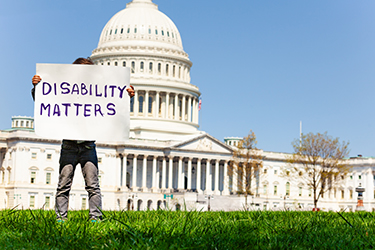Public health professionals know the value of advocacy and how it can transform health outcomes, especially for marginalized populations. Among those that can benefit from the work are people with intellectual and developmental disabilities.
In April, hundreds of professionals came together in Washington, D.C., to advocate for people with disabilities. Organized by major U.S. disability organizations, the Disability Policy Seminar offers an opportunity to advocate for better health services for people with disabilities as well as higher pay and more training for their caregivers.
Held annually, the event helps supporters “share and learn about and advocate for our federal legislative concerns that impact people with disabilities,” Elizabeth Graham, an attendee with autism, told The Nation’s Health.
“It is also an opportunity for people to become more familiar with the IDD community as a whole,” she said.
For several years, Congress has failed to provide adequate funding to meet the needs of the disability community, speakers at the event emphasized. The failures are exacerbated by the threats of government shutdown and budget cuts to important programs that provide access to people with disabilities.
Programs most impacted by funding inadequacies include those authorized by the Developmental Disabilities Assistance and Bill of Rights Act of 2000, the Individuals with Disabilities Education Act, the Assistive Technology Act, the Autism Cares Act and the Lifespan Respite Care Act.
Advocates hope to change the pattern by advancing legislative priorities that improve funding and care for people with disabilities.
One particular area of concern is Medicaid. Many people with IDD are eligible for long-term services and support through the program. But direct service providers — who provide care and assistance for people with disabilities — say they cannot retain workers because of inadequate pay. The situation has become more dire since the end of the emergency phase of the COVID-19 pandemic. Additional Medicaid funding made available during the pandemic’s height ended last year, causing concern among direct service providers that the demand for care will not be met.
The Home and Community-Based Services Relief Act would provide dedicated Medicaid funds to states to stabilize home and local services for people who are disabled, including those with IDD, and retain and recruit care workers. Without the option of home and community care for people with IDD, some people are unnecessarily institutionalized, while others must rely on unpaid family care.
Another important bill is the Better Care, Better Jobs Act, which would expand home and community-based services for older adults, injured workers and people with disabilities while also increasing Medicaid reimbursement. The bill would expand access to quality care and lead to better pay and benefits for direct service professionals.
As people with IDD struggle under the same determinants of health that the public health workforce addresses, it is imperative that the population is included in conversations related to health equity. It is also important that their voice and experiences are at the center of decisions being made and policies being passed.
Lawrence Haynes, MA, is program manager for racial equity within APHA’s Center for Public Health Policy.
Photo by SerrNovik, courtesy iStockphoto